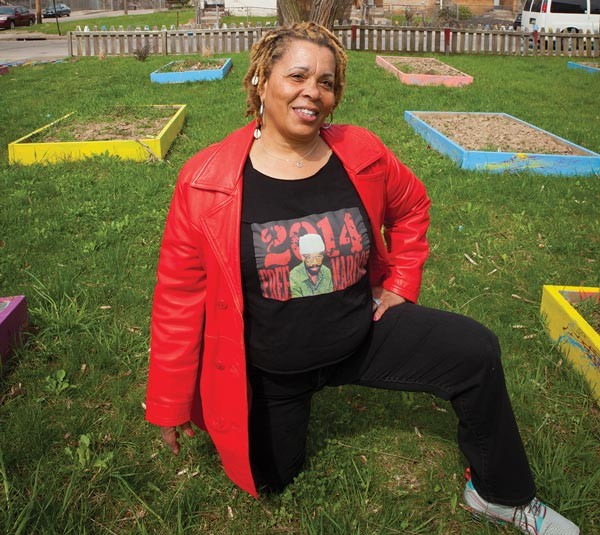Ayanna Rauf became an activist back in 1964, at age 16. Walking past a storefront on her way to Schenley High School one day, the Homewood girl spotted signs seeking volunteers for the Student Non-Violent Coordinating Committee and the Congress of Racial Equality. "I went into that building and my life has never been the same," says Rauf.
Her time with iconic civil-rights organizations — she says she was also a Midwest organizer for Martin Luther King Jr.'s Poor People's Campaign — presaged Rauf's work with the Black Panther Party, life on a Butler County farming commune and jobs with more mainstream social-service organizations. Today, the Perry South resident's focus remains radically fundamental: rebuilding communities by restoring people's ability to feed themselves properly.
Rauf co-hosts New York City-based Ecosocialist Horizons' fourth annual MOSAIC Convergence, an event linking social justice to environmentalism, and urban gardening to political resistance. The Movement of Oppressed Sectors Acting In Concert takes place April 25-27 at Homewood's Community Empowerment Association.
The convergence includes forums with titles like "Fighting Fracking and Frisking, Mass Incarceration and Mass Extinction," but also a day-long garden-raising — like an Amish barn-raising — in Homewood. And there's live music.
The agenda is intentionally broad, says Kanya D'Almeida, of Ecosocialist Horizons. The group considers injustices like economic inequality and the U.S. imprisonment rate — the world's highest — as products of the same industrial capitalism that's produced climate change and deforestation.
"We see things as being very holistic," says D'Almeida. "No struggle is isolated from the others." One goal is linking the environmental movement, long identified with affluent white folks, with prison activism, environmental justice and other causes disproportionately affecting people of color: "People who care about one should sort of care about the other as well."
Socialist countries like Soviet Russia have brutalized the planet, too, acknowledges D'Almeida. But ecosocialism isn't just about workers retaining the fruits of their labor; it also places environmental stewardship "at the center of that debate," she says.
Prison issues, meanwhile, are central to the convergence — previously held in upstate New York, Vermont and Amherst, Mass. — coming to Pittsburgh. Rauf first met Ecosocialist Horizons activists in April 2013, at a New York event dedicated to freeing Russell Maroon Shoatz, the former Black Panther serving two life sentences for the 1972 murder of a Philadelphia police officer. Of Shoatz's four decades in prison (which include two escapes), he'd spent a total of 22 years in solitary confinement.
Now at the State Correctional Institution in Graterford, Pa., Shoatz was released from solitary in February. But supporters consider the 70-year-old as a political prisoner for his prison activism. His release from isolation became a cause for advocates including the Pittsburgh-based Abolitionist Law Center and Nobel laureate Archbishop Desmond Tutu.
Rauf, who first met Shoatz in 1977, was inspired by his writings on issues including community self-reliance, food security and freeing ourselves from the "poison" peddled by the processed-food industry. "I can live in a decent house, but if I'm eating bad food, it won't matter," sums up Rauf. Noting Pittsburgh's urban-gardening renaissance, she suggested holding the 2014 convergence here. "Pittsburgh just seemed like a great location to do it," says D'Almeida. "There's a huge number of empty lots. ... There's so many spaces food can be grown that's just lying fallow."
Rauf says she expects about 200 attendees at the convergence, including out-of-towners. Registration costs $25-100, on a sliding scale, but no one will be turned away for lack of funds, and free child-care is available.
Convergence sponsors include urban-gardening advocates Grow Pittsburgh and Mama Africa Green Scouts, a Hill District-based group that teaches gardening to kids. Speakers include civil-rights veteran Colia Clark as well as author, educator and Ecosocialist Horizons co-founder Joel Kovel.
Friday evening's concert, sponsored by consciousness-raising arts collective Scientific Soul Sessions, features local rappers including Blak Rapp Madusa and New York hip-hop artists Prince Akeem and Brian Anthony. Saturday night, the internationally touring Villalobos Brothers perform.
Saturday's work teams will improve the raised beds and pathways at two Community Empowerment Association plots: a vegetable garden and a pollinator garden. "We want the community to feel, ‘That's our garden,'" says Rauf.
Gardening, says Rauf, grows community as well as food, connecting elders to kids: "Not only are you building a relationship, you're nurturing a person."
By the window of Rauf's small apartment sit containers of seedlings planted by her grandchildren: lettuce, carrots, pumpkin. On the wall hang two framed 2013 letters from the still-incarcerated Shoatz, both proposing marriage. Rauf said yes.
"I love him a lot," she says. "I love him for the importance he places on our community."















